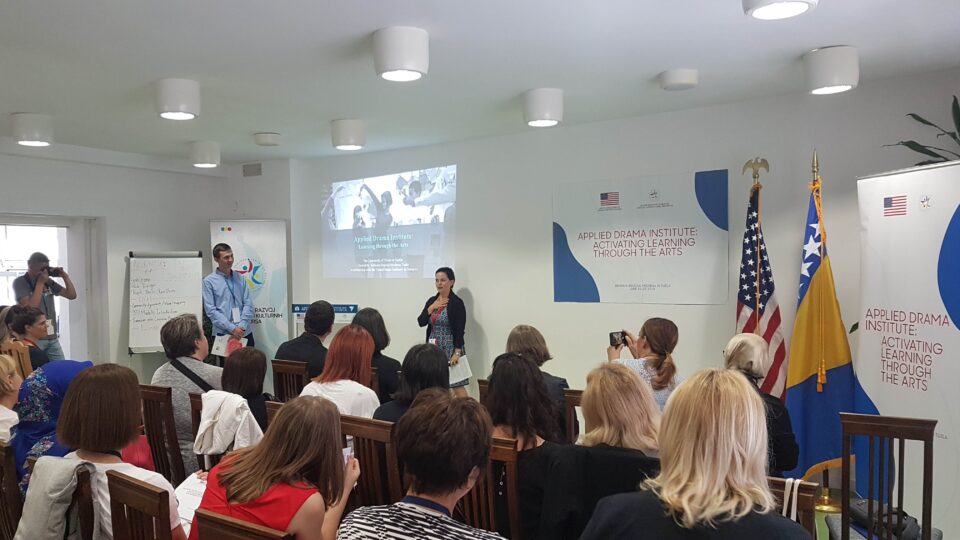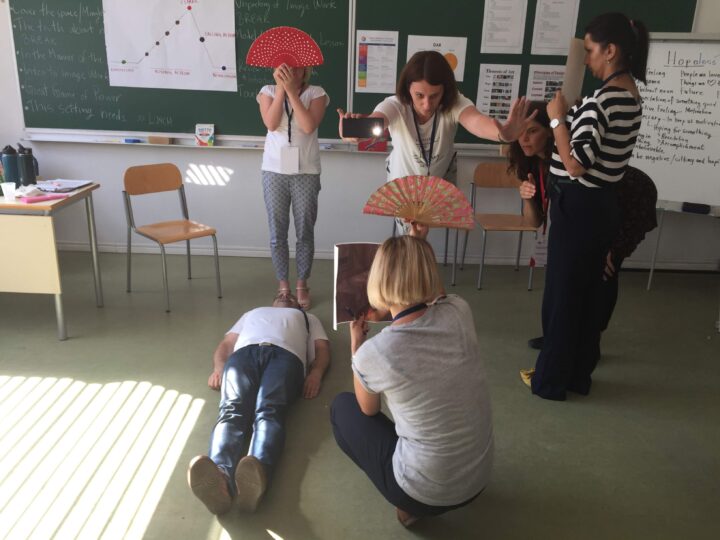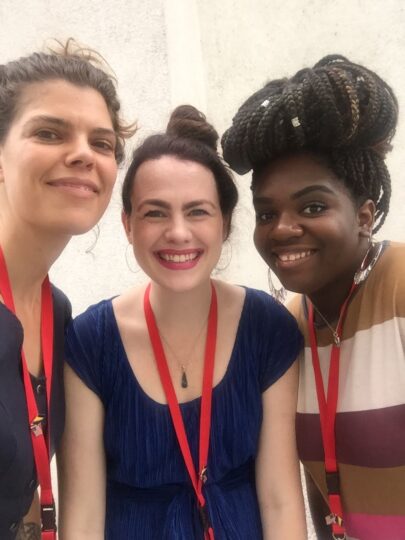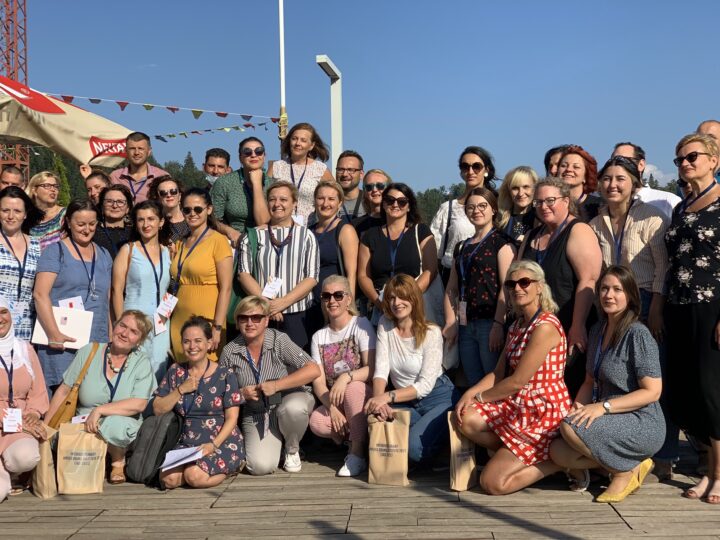For years, faculty member Katie Dawson and her colleagues have placed arts-integrated education at the forefront of their research and teachings. Through programs like Drama for Schools (DFS), directed by Dawson in collaboration with faculty member Lara Dossett and College of Education professor Stephanie Cawthon, they have worked with educators to implement arts-based strategies in classrooms across the country. Thanks to a connection Dawson has at a U.S. Embassy abroad, she expanded the reach of DFS’s programming beyond the United States in 2014. Since then, she has led presentations and workshops on drama-based pedagogy in five countries around the world, often accompanied by UT Austin graduate students. Recently, one such program took root in Bosnia and Herzegovina, a country with deep ethnic divides following the Bosnian War a quarter of a century ago. In order to better understand her work, we spoke with Dawson about the Applied Drama Institute and its efforts to empower educators through drama-based pedagogy.
What inspired the creation of the Applied Drama Institute and its work in countries around the world?
[Dawson] The Applied Drama Institute is an expansion of Drama for School’s national research and practice. It represents our efforts to develop a transformative professional learning model in arts integration which can be used to engage global communities around issues of equity and justice in education in a variety of contexts.
How did you form a connection with the U.S. Embassy in Sarajevo to assist in the initial formation for your work in Bosnia and Herzegovina?
This is a story about the importance of the friendships we build through our undergraduate education. A friend and colleague from my undergraduate program in theatre, Elizabeth Blumenthal, joined the foreign service after graduation. Eventually she became a diplomat focused on arts and culture. When Elizabeth was posted in Croatia in 2014 she invited me and two UT graduate students to lead my very first Applied Drama Institute through the U.S. Embassy in Zagreb. We learned a lot through the process.
After that time, I began doing extensive global work in South Australia. It was there that I really developed a method and approach to working with global partners around questions of educational change. In 2017 Elizabeth was at a new diplomatic post in Sarajevo. She invited me to return for another project. This time, we worked together to design a long-term project which could build slowly and engage with the educational complexities of working in a post-conflict country with three presidents and significant ethnic divides.

Can you talk a bit about your first-hand experience working with teachers from Bosnia and Herzegovina in your initial program initiatives? How did their enthusiasm and input shape future renditions of this project?
25 years after the war in Bosnia and Herzegovina (BiH), a complex, post-conflict reconstruction resulted in regionally separate education systems, ethnically different and yet mutually intelligible official languages and ethnically segregated schools in some regions. Amidst limited resources and a lack of training opportunities, educators in BiH struggle to move beyond divided and rigid curricula.
The Applied Drama Institute is designed to align with the U.S. State Department’s efforts to support a more just and equitable society. Each project we lead in the country always involves inter-ethnic participation. We lead professional learning communities in-person and virtually that use arts-integration strategies—what we call drama-based pedagogy—to increase critical and creative thinking and perspective taking in English teaching and other areas of the curriculum.

The project has been hugely successful, partly because we’ve built it slowly over time. In 2018 we led five one-day introduction to drama-based pedagogy sessions for K-12 teachers and university educators. During 2019, I co-designed and led a four-day Applied Drama Institute for 50 educators with UT graduate students. In fall 2019 and spring 2020, I had a Global Classroom Exchange which partnered two Bosnian academics from universities with a UT course in drama-based pedagogy. We all worked together on a shared unit project until COVID-19 made things a bit messy in spring 2020.
In fall 2020, we led a six-month virtual project focused on a country-wide reading of the young adult novel Dear Martin as part of the U.S. Embassy’s One Book, One BiH program; this was co-led by two Drama and Theatre for Youth and Communities (DTYC) alumni. In 2021 I returned to BiH to lead an in-person project with two DTYC graduate students which was co-led by four local educators. We co-designed and co-led the entire project for 34 high school and university educators (It was the first project of its kind! Universities don’t partner together due to ethnic conflicts typically.). In 2021-2022 I supported a College of Education Ph.D. student and a visual art education graduate student to create a six-month virtual learning community project, entitled the Arts Integrated Learning Community. This project featured a series of UT alumni teaching workshop sessions in drama/theatre strategies.
Why drama-based pedagogy? What important tools does it offer for educators around the world?

The teachers were excited (and a little nervous) to learn arts-based strategies that centered inquiry, the body and creative discovery. This was very different than the typical teaching approach in the country which is typically focused on lectures and the teacher “filling” students full of new information. Drama-based pedagogy (DBP) uses active and creative strategies from a range of art forms to increase student engagement and expand pedagogic possibilities across the curriculum. Arts-based pedagogies use one or more art forms to stimulate creative processes and deepen understanding in non-arts learning (Lee, Cawthon & Dawson, 2013; Ludwig & Song, 2014).
As a specific form of arts-based pedagogy, drama-based pedagogy has been used in multiple locations across the United States. The pedagogical approach has a foundation in theatre-based arts integration techniques including: activating dialogue tasks, theatre games as metaphor, image work and role-play which are used to engage teachers and students in cognitive, affective and aesthetic learning experiences (Dawson & Lee, 2018). DBP is experiential and problem-posing rather than sedentary and abstract. It engages participants across multiple dimensions (physical, social, emotional and cognitive) and includes tasks that require critical and creative thinking.
Which countries has the Applied Drama Institute reached since its inception?
The Applied Drama Institute (our global DFS project) was first run in Zagreb, Croatia in partnership with the U.S. Embassy in Zagreb in 2014. Then we ran multiple Institutes with partners in South Australia between 2014 and 2019. They are still running their own version of the Institute there on their own (they just sent me pictures a few weeks ago!). I ran a digital version of the institute in Taiwan in January of 2021. We are supposed to do a second (in-person) Institute in Taiwan when I have the availability and COVID is managed. We ran our first Applied Drama Institute in Poland in fall 2021. We will return to do another Institute in Poland in fall 2022 with UT students.

How have you and your collaborators continued to innovate and expand your work?
Our work locally and globally is designed to support participants to name and drive their own personal and professional transformation. We design a unique set of professional learning activities and assessment measurements curated to capture individual and collective experience in relationship to research questions co-designed with our project partners. We are deeply interested in what happens when individual educational stakeholders use the arts to consider the relationship between their teaching beliefs, the educational context and the needs and identities of the learner. We find that many teachers and students “alter one’s understanding of oneself” (Valde & Kornestky, 2002, p. 5) through our programs, training and classes, but any claims of transformation are always unique to their own journeys and goals.
In short, we follow bell hooks’ (1994) lead and “teach to transgress” as we use professional learning in arts integration to support teachers and students to make “education the practice of freedom” (p.12). We invite and support teachers, teaching artists and students to be agentic change-makers within their own contexts. We recognize that when teachers and students are given the opportunity to name and drive their own healing and change, we increase our shared capacity to transform schools, and therefore society, for the better.
These sentiments are what keep the Applied Drama Institute growing and thriving, sharing arts-integrated approaches to education with more teachers every year. For participating graduate students, such as DTYC grad Giana Blazquez Bultman, the Applied Drama Institute provided new perspectives on the impact of arts-based pedagogy. “Seeing a group of educators from multiple ethnic and cultural groups that historically have tension with one another in Bosnia and Herzegovina come together and recognize drama-based pedagogy as a tool to create change was something that will always stay with me as an educator,” shared Blazquez Bultman.
Dawson has plans to return to Warsaw, Poland this fall for another in-person Applied Drama Institute, with hopes to connect with educators who are supporting Ukrainian refugees. She is also working on a new country-wide reading project with the U.S. Embassy in Sarajevo, which will reach around 3,000 educators in high schools and universities across Bosnia and Herzegovina. She plans to continue employing College of Fine Arts graduate students and alumni in her efforts to engage with drama-based education in and beyond the United States.


